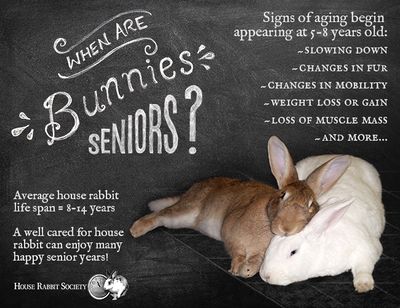Elderly rabbits
This article is incomplete because it lacks depth or is unfinished. Help by expanding it.
As most healthy rabbits can live up to (and even over) 8 to 12 years with good care, any rabbit over 6 years of age is considered a senior rabbit or elderbunny. Giant breeds may reach their golden age a bit sooner with their lower 5-6 year life expectancy.
Differences in care
Aging in rabbits can bring on changes in body condition and behavior. It is a good idea to bring your rabbit to a rabbit-savvy veterinarian every 6 months to catch any sicknesses or medical conditions early on for effective treatment. Your veterinarian may also recommend annual blood work, urinalysis, fecal, and radiographs as necessary.
Weight
Due to muscle loss from inactivity, elderly rabbits can easily lose weight as they age. It is important to weigh elderly rabbits regularly to keep track of progress, and it may also be a good idea to add more pellets or high calorie treats to help them keep on weight. See Underweight rabbits for more tips.
Mobility
Elderly rabbits are more likely to develop signs of arthritis or spondylosis, which may need an environmental change to support their lower mobility.
A few supplies that may be useful with elderly bunny mobility:
- low-sided litter boxes - elderly rabbits may not enjoy jumping as much anymore.
- Essential Medical Supply Sheepette Synthetic Lambskin, 30" x 60" - soft flooring with liquid wicking properties to keep your elderly bunny dry if they begin refusing to use litter boxes. Place pee pads underneath to catch urine and replace regularly. See Disabled Rabbits for a full description on layering techniques.
- Kitty City Raised Cat Food Bowl - elderly rabbits may find it hard to bend over as much to eat on the floor. You can use mini bungee cords to keep the bowls upright against a cage or exercise pen fence.
Hygiene
As elderly rabbits lose flexibility, they may not wish to bend over to eat cecals directly from their bottom anymore. This can make them prone to poopy butt, and it is important to help keep them clean to avoid more serious issues such as flystrike. Other times, as a consequence of arthritis and other similar health issues, rabbits may lose their litter habits completely and become incontinent with urine scald.
Depending on the degree of mess, regular sanitary shaves may help keep the area clean, but butt baths may be necessary if trimming the fur, dry baths, and combing are not sufficient.
Online support communities
The following are communities that specialize in providing help to elderly and senior rabbits.
- Facebook, Elderbuns (Private group)
Further reading
- Sarah Dehn. (2018). Care of geriatric rabbits
- kinenchen. (2013). At Home Care Guide for Elderly Bunnies
- DisabledRabbits.com. Senior Rabbits
- Rabbit Welfare Association & Fund. Caring for Senior Rabbits
- Gary Riggs, DVM. Problems of the Geriatric Rabbit
- Gil Stanzione, DVM. Aging Bunny, Aging Bladder
- Michelle Wilhelm. Living With An Elder Bun
- Astrid Kruse, DVM. Caring for the Elderly Bunny [PDF]
- PetCoach. Caring For Your Senior Rabbit
- Mark E. Burgess DVM. (2011). "Older and healthy" in The Rabbit Advocate, Winter 2011
- Sandi Koi. (2008). Elderbuns
- Elizabeth TeSelle. (1994). To a Long Life: Geriatric Workups


